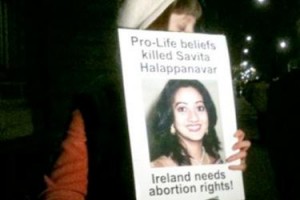‘Highly likely’ Halappanavar would be alive if termination given, inquest told
Posted in politics on April 18th, 2013 by monika – Be the first to commentThe Irish Times, 17.4.2013 by Kitty Holland, Paul Cullen
Former master of Holles Street says obstetricians working in a legal vacuum as to when termination can be performed

Dr. Peter Boylan arriving at Galway County Hall for the inquest into the death of Savita Halappanavar Photograph: Brenda Fitzsimons/The Irish Times
Savita Halappanavar would probably be alive today if she had been given a termination of her pregnancy when she requested it, the former master of the National Maternity Hospital has told her inquest.
Dr Peter Boylan said that if Ms Halappanavar had been given a termination on the Monday or Tuesday, one or two days after she was admitted last October 21st, she would “on the balance of probabilities”, still be alive.
“It is highly likely she would not have died” if she had been given a termination earlier, he added.
Read full article: www.irishtimes.com









